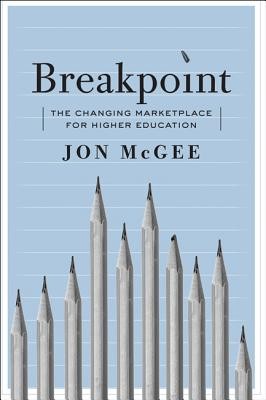
- We will send in 10–14 business days.
- Author: Jon McGee
- Publisher: Johns Hopkins University Press
- ISBN-10: 1421418207
- ISBN-13: 9781421418209
- Format: 14.7 x 22.6 x 1.5 cm, softcover
- Language: English
- SAVE -10% with code: EXTRA
Reviews
Description
How can colleges adapt to disruptive change while staying true to their educational values?
Second Place Winner of the Typographic Jacket from Washington Publishers
The challenges facing colleges and universities today are profound and complex. Fortunately, Jon McGee is an ideal guide through this dynamic marketplace. In Breakpoint, he argues that higher education is in the midst of an extraordinary moment of demographic, economic, and cultural transition that has significant implications for how colleges understand their mission, their market, and their management.
Drawing from an extensive assessment of demographic and economic trends, McGee presents a broad and integrative picture of these changes while stressing the importance of decisive campus leadership. He describes the key forces that influence higher education and provides a framework from which trustees, presidents, administrators, faculty, and policy makers can address pressing issues in the aftermath of the Great Recession.
Although McGee avoids endorsing one-size-fits-all solutions, he suggests a number of concrete strategies for handling prospective students and developing pedagogical practices, curricular content and delivery, and management structures. Practical and compelling, Breakpoint will help higher education leaders make choices that advance their institutional values and serve their students and the common good for generations to come.
EXTRA 10 % discount with code: EXTRA
The promotion ends in 17d.10:21:09
The discount code is valid when purchasing from 10 €. Discounts do not stack.
- Author: Jon McGee
- Publisher: Johns Hopkins University Press
- ISBN-10: 1421418207
- ISBN-13: 9781421418209
- Format: 14.7 x 22.6 x 1.5 cm, softcover
- Language: English English
How can colleges adapt to disruptive change while staying true to their educational values?
Second Place Winner of the Typographic Jacket from Washington Publishers
The challenges facing colleges and universities today are profound and complex. Fortunately, Jon McGee is an ideal guide through this dynamic marketplace. In Breakpoint, he argues that higher education is in the midst of an extraordinary moment of demographic, economic, and cultural transition that has significant implications for how colleges understand their mission, their market, and their management.
Drawing from an extensive assessment of demographic and economic trends, McGee presents a broad and integrative picture of these changes while stressing the importance of decisive campus leadership. He describes the key forces that influence higher education and provides a framework from which trustees, presidents, administrators, faculty, and policy makers can address pressing issues in the aftermath of the Great Recession.
Although McGee avoids endorsing one-size-fits-all solutions, he suggests a number of concrete strategies for handling prospective students and developing pedagogical practices, curricular content and delivery, and management structures. Practical and compelling, Breakpoint will help higher education leaders make choices that advance their institutional values and serve their students and the common good for generations to come.


Reviews